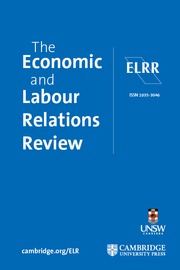-
- You have access: full
- Open access
- ISSN: 1035-3046 (Print), 1838-2673 (Online)
- Editor: Diana Kelly University of Wollongong, Australia
- Editorial board
As of 2026, all articles are published on an open access basis.
February Article of the Month
Our February Article of the Month by Breitkreuz and Baird critically examines women’s economic empowerment as a pathway to gender equality, highlighting both its promise for growth, autonomy and education, and its risks when women’s wellbeing and unpaid care work are overlooked. In our February article of the month 'Women’s economic empowerment: A global pathway to gender equality?', Rhonda Breitkreuz and Marian Baird critically examine one of the most prominent strategies shaping global gender equality agendas. Positioned as a safeguard against poverty and precarity, women’s economic empowerment is widely promoted—particularly in the Global South—as a transformative pathway to social and economic change. Drawing on a critical feminist lens, the authors trace the evolution of the concept of empowerment and highlight its widely cited benefits, including economic growth, improved access to tertiary education, increased labour market participation, and greater autonomy for women. However, the article also challenges uncritical enthusiasm for women’s economic empowerment by foregrounding its risks. Breitkreuz and Baird identify three key concerns: the instrumentalisation of women as a nation’s ‘natural resource’, the assumption that increased market participation automatically leads to empowerment despite precarious labour market realities, and the persistent undervaluation of unpaid reproductive and care work. The article concludes with cautious optimism, pointing to UN Women’s (2024) holistic framework as a promising shift towards more inclusive and wellbeing-centred approaches—if adopted widely and meaningfully.
Economics « Cambridge Core Blog

-
Happy Publication Day to Entrepreneurial Finance, 2e
- 30 January 2026,
- Edited by Luisa Alemany and Job J. Andreoli Publishing 30 January 2026 | Paperback / $65.00 / £50.00 / 9781009537834 Order an examination copy About the Book Rigorously revised, with brand new chapters on additional private sources of funding, due diligence, sustainable finance, and deep tech investing, the second edition of this successful textbook provides a cutting-edge, practical, and comprehensive review of the financing of entrepreneurial ventures.…...

-
Revising An Economic History of Europe for a Rapidly Changing World
- 05 August 2025,
- How we updated the classic textbook An Economic History of Europe to reflect changes both in the world and in how we teach and learn economic history.

The ELRR Socials